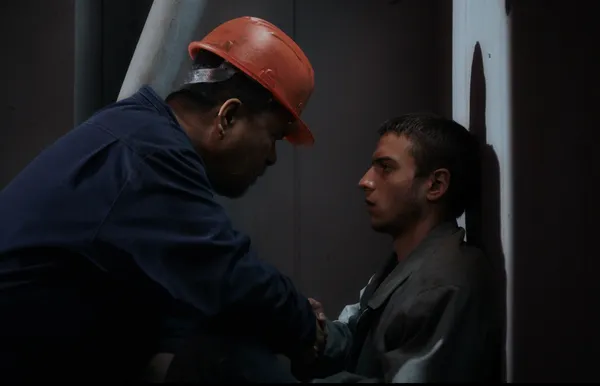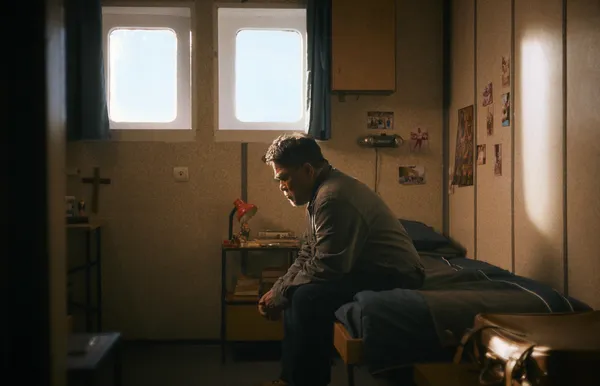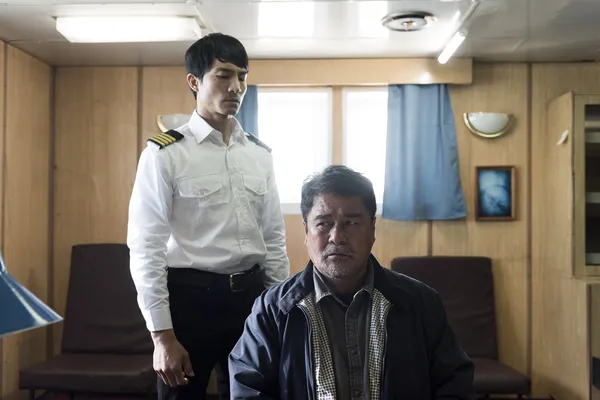 |
| Joel (Soliman Cruz) and Dumitri (Niko Beker) in To The North. Mihai Mincan: 'I think the space played a huge role, because it was so claustrophobic and I wanted to convey that feeling' |
To The North, which screens at Thessaloniki Film Festival this week, sees a Romanian ship stowaway (Niko Beker) become dependent on a Filipino Bosun for his survival (Soliman Cruz) aboard a ship where the Taiwanese captain shows a zero-tolerance approach. Romanian director Mihai Mincan explores the ways that it is not prejudice but fear that increasingly drives the tensions between the two men as tensions mount on the high seas. In the second part of our interview with Mincan, he told us about moving from documentary into fiction, his movie influences and how his own personal history feeds into the theme of fear that drives To The North.
Amber Wilkinson: Your CV is dominated by documentary and this film is also based on a true story - but taken into a fictional realm. How did you approach it?
Mihai Mincan: I worked for newspapers for 12 or 13 years, I think. And I, but what interested me most, even during this time, was fiction. I think working for the press really helped me in two ways. First, to really learn how to listen to another person, just keep your mouth shut and listen and be present. And the second one is to understanding how a real event has a different function than just being an event - what does it lead to, what's the metaphysical part of it? How can you speak to other people about their own lives? Doing documentaries was something that I was interested in during those years. But I think nowadays, I tend to think of it more as a continuation of my working in press. To The North was written six years ago, I've always wanted to do fiction more than documentary. I read a lot, and I get certain things from real events. But it's something that is very short lived somehow. I take the real event, but five seconds later, I always think, ‘Okay, this is the real event, but what does it tell me? How can I work with it?’ So I wasn't really interested in creating something with a documentary feel.
AW: It has a strong western feel in places, the way you let the faces fill the frame. I feel as though there’s more than one influence going on. For example, when we see people moving about from place to place on the ship, that feels rooted in documentary, but when the men are together, it’s much more stylised. Were you influenced by other fictional films?
MM: In regards to what you said earlier, I think the space played a huge role, because it was so claustrophobic and I wanted to convey that feeling in two ways. First, the big close ups. When you're in a space of two metres square, when somebody is speaking to you, what you look at is the face, not something else, and it kind of closes your world. And that's the only person that is really important there. On the other hand, what I was really interested in is, given that it's such a claustrophobic space and very limited space, it felt to me that the way the characters go from one place to another, you know, they're there. The way they walk from place A to place B is almost as important as what they do there. Because they're like rats in a cage somehow, they just move in the same space.
There were a lot of influences. I'm a big movie goer, and I love movies. I know for the close ups, a big influence was Paul Thomas Anderson's work, you know, especially The Master. But there were a lot of influences from the films I grew up with, which are not necessarily arthouse films. Like early Scorsese films, you know, Mean Streets, Taxi Driver, that part of his career. Other films, like maybe Alien. I remember going to the cinema and films like Alien creating so much excitement for me, being able to take part in that story. And something of that, I think, remained in my brain and helped me see the world and see a scene.
AW: It’s interesting that you mentioned Scorsese, because that idea of morally complex things not being black and white, but basically just being a very large grey area is very dominant in this film. It's not really about people being good or bad, it's really about how being afraid or just simply wanting to survive can drive people to do a bad thing, or what we might class as that. It’s not that people are making a value judgement, ‘Am I doing a bad thing or a good thing?’. They're basically emotionally terrified or just really want to survive.
MM: It's good that you mentioned fear, because I think fear is actually the main theme. And it's something generational for me. I'm 42, I hit my teenage years right after the revolution. And I think the main thing that we grew up with as Romanians of that age was fear. You had to pass your exams just to get out of that shitty little town that you grew up in. You had to have money in order not to starve, you had to live a better life, you know, and everything was trapped in this sensation of, if you fail, then you're doomed, somehow. So it was this constant fear that we were living with.
As I grew up, and became an adult, I kind of started thinking more about what this fear means. In the context of today, when I look around at the newer generation, you know, they almost never speak, they're afraid of fear. They're afraid to speak about fear. You have all these books about how to not feel fear, how to feel good, you know, ignore it. And, for me, it still remains one of the biggest and most important themes in history. And for me, it's like the most important thing in my life right now. And I don't take it in a negative way. I mean, it's not like I'm a fearful person who thinks in a doomed kind of way, I just find it really interesting to think of what fear does to you in a certain context. And I think you're right, yes. It's about fear, the film, and how fear affects you. And it's about maybe the worst kind of fear, the fear of your life being in someone else's hands.
AW: Yes, because there’s a lot of lack of control in this film. Everybody on that ship, even the captain, is in a sense being controlled by another force.
MM: Yes, by money, in this case. It’s the most important theme in the film and I think it kind of shows that, if you want to break up with fear, this breaking up with the fear that you feel, it's always something violent. There's always some kind of violence implied.
AW: How was it to work with that multinational cast? It’s quite unusual to have such a broad sweep of people. Was the communication easy? Did it even help to a degree, since the film is in part about different factions on the ship.
MM: It helped a lot. There are long parts in To The North in which the Filipinos, for example, speak Tagalog, which is the national language, and when we rehearsed, it was the first time I had contact with somebody speaking in a language that was totally different from mine, and I pretended to understand him. So I kind of, I had the papers in my hand that I kind of tried to follow just to see at what point he is. But that was just for rehearsing.
When we started shooting, something actually quite beautiful happened. Because when I direct Romanian actors, as it happens with any director who directs in his native language, you tend to be attentive to intonation, the way he phrases, the way he puts accents, just has to sound right to your ear. But when somebody is speaking in a different language than yours, you kind of forget all these things, and you kind of look only at the face, only at the gestures.
So I think, in a way, it's acting with a big A. You're so much more present. You’re just looking at that person and trying to feel what he's conveying to you in a different language rather than to find out that word wasn't right. It was great having this Babel Tower. Yes, by the time we used the Romanian actor and he started speaking in Romanian, which is actually the last part of To The North. It felt really strange.
AW: Going forward, you're saying that fiction is something that kind of appeals to you more. So do you think you're going to be making more fiction features?
MM: I already wrote the next script. I intend to work in fiction features, hopefully it will not take another six years. It's Romanian this time. It's a coming of age story and it's also based on a real event, but also fictionalised, very much like To The North. And it's about an eight-year-old girl who kind of indirectly witnesses one of the most atrocious crimes in Romanian history. It's actually one of the crimes that there was no guilty person found up to this day. But the film doesn’t concern the murder so much in itself but the way this young girl must learn how to live with herself and how to react to the hostile environment around her.
Read the first part of our interview with Mincan, about shooting on a ship and the film's intense sound design























